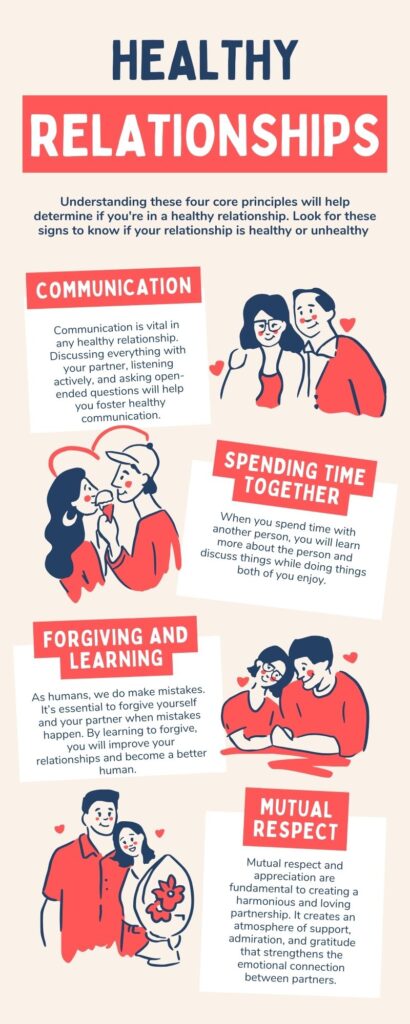We are a professional review company that receives compensation from companies whose products we review. We test each product thoroughly and give high marks only to the ones that are the very best. We are independently owned, and the opinions expressed here are our own.
Authenticity in relationships means being true to oneself and fostering an environment where both partners can be themselves without fear of judgment or rejection. It’s about honesty, openness, and genuine connection. Understanding and practicing authenticity can lay the foundation for healthier and more fulfilling relationships for young adults.
Being authentic builds trust, encourages personal growth, and enhances long-term relationship satisfaction. This article will explore the importance of authenticity, how to recognize and cultivate it, and the challenges you may encounter. By embracing authenticity, you can create deeper connections and more meaningful relationships.
Are you ready to discover the power of authenticity in relationships? Read on to explore why being genuine matters and how to foster a more authentic connection with your partner.
Why Authenticity Matters
Authenticity is the cornerstone of any solid and lasting relationship. It goes beyond surface-level interactions and delves into the core of who we are as individuals. Here’s why authenticity matters so much in relationships:
Building Trust and Intimacy:
Authenticity fosters trust between partners. When you are genuine and honest, your partner can trust that you are truthful about your feelings, intentions, and actions. This trust forms the bedrock of intimacy, allowing both partners to feel safe and secure. Honest communication leads to deeper understanding and a stronger emotional connection.
Here are step-by-step instructions on how to create trust and intimacy in new relationships.
Enhancing Personal Growth:
Being authentic encourages self-awareness and self-acceptance. When you are true to yourself, you allow your partner to see the real you, including your strengths and vulnerabilities. This openness strengthens your bond and supports each other’s personal growth. By being authentic, you inspire your partner to embrace their true self, fostering a relationship where both individuals can grow and thrive.
I discuss how to encourage and enhance personal growth here.
Long-Term Relationship Satisfaction:
Authenticity is linked to long-term happiness and relationship satisfaction. Pretending to be someone you’re not or wearing a mask can lead to resentment, misunderstandings, and emotional distance. When both partners are authentic, it reduces the chances of miscommunication and unmet expectations. Authentic relationships are built on mutual respect, understanding, and genuine connection, leading to lasting satisfaction.
To build trust through authenticity and openness, partners must be willing to be vulnerable.
Avoiding the Pitfalls of Pretending:
Pretending to be someone you’re not can be exhausting and ultimately unsustainable. It creates a barrier between you and your partner, preventing true intimacy. Over time, the facade can crumble, leading to disappointment and conflict. Embracing authenticity from the start ensures your relationship is founded on genuine, unfiltered interactions.
In this article, I discuss the importance of being true to yourself, no matter what.
Frequently Asked Questions About Authenticity in Relationships
1. How does authenticity build trust in a relationship?
Authenticity builds trust by fostering honest and open communication. When you are truthful about your feelings, intentions, and actions, your partner knows they can rely on you, which in turn strengthens the emotional bond.
2. Why is personal growth essential in a relationship?
Personal growth is crucial because it enables both partners to develop individually while supporting one another. This mutual growth strengthens the relationship, making it more dynamic and fulfilling.
3. How can pretending to be someone you are not affect a relationship?
Pretending can lead to misunderstandings, unmet expectations, and emotional distance. It creates a barrier that prevents true intimacy, eventually leading to disappointment and conflict.
Understanding why authenticity matters can help you see how it forms the foundation of a healthy, satisfying, and long-lasting relationship. Let’s explore the signs of authenticity in a relationship and how to recognize them.

Signs of Authenticity in a Relationship
Recognizing authenticity in a relationship is crucial for understanding whether you and your partner are genuinely being yourselves. Here are some signs that indicate a relationship is built on authenticity:
Open and Honest Communication:
One of the most significant signs of authenticity is the ability to communicate openly and honestly. This means sharing your genuine thoughts and feelings without fear of judgment. In an authentic relationship, both partners feel comfortable discussing their hopes, dreams, fears, and mistakes. This level of honesty fosters a deep emotional connection and trust.
Example: Sarah and Jake always make time each day to discuss their feelings and experiences. They listen to each other without interrupting and validate each other’s emotions. This open communication helps them navigate challenges together and maintain a strong bond.
Click here for more tips on fostering open and honest communication in your relationship.
Mutual Respect and Acceptance:
Authentic relationships are characterized by mutual respect and acceptance. Both partners accept each other’s flaws and differences without trying to change them. They respect each other’s boundaries and appreciate their individuality. This respect creates a supportive and nurturing environment where both partners can thrive.
Example: Emily loves painting, while Tom is passionate about hiking. Instead of trying to change each other’s interests, they support and encourage one another. Tom attends Emily’s art shows, and Emily joins Tom on his hiking trips, respecting and valuing their passions.
Here are additional insights into the importance of respecting one another’s differences.
Consistent Actions and Words:
In an authentic relationship, actions align with words. This consistency builds credibility and trust. When you say you will do something, you follow through on it. Authenticity means being reliable and dependable, which strengthens the relationship’s foundation.
Example: When Alex promised Jamie he would help her with a work project, he followed through despite his busy schedule. His consistent actions showed Jamie that she could rely on him, reinforcing their trust and connection.
Here’s why consistency is vital in relationships.
Embracing Vulnerability:
Authentic relationships allow space for vulnerability. Sharing fears, insecurities, and personal struggles with your partner without fear of being judged or rejected is a sign of authenticity. Vulnerability fosters intimacy and deeper emotional connections.
Example: After losing his job, David felt vulnerable and insecure. He spoke to his partner, Rachel, about his fears and concerns. Instead of judging him, Rachel supported and reassured him that they would get through it together. This openness brought them closer and strengthened their bond.
Click here to read my article about the importance of vulnerability.
Encouraging Each Other’s Growth:
In an authentic relationship, partners encourage and support each other’s personal growth. They celebrate each other’s achievements and provide a safe space for growth and self-improvement. This mutual support is a cornerstone of an authentic connection.
Example: Liam returned to school to pursue a new career. His partner, Mia, was incredibly supportive, helping him balance his studies with their daily life. Mia’s encouragement and belief in Liam’s goals made their relationship stronger and more fulfilling.
Frequently Asked Questions
1. How can I encourage open and honest communication in my relationship?
Foster an environment of trust and non-judgment. Listen actively, validate your partner’s feelings, and share your thoughts and emotions openly.
2. Why is mutual respect necessary in a relationship?
Mutual respect ensures that both partners feel valued and appreciated. It allows for individuality and supports a healthy, nurturing relationship dynamic.
3. How do consistent actions and words build trust?
Consistency shows that you are reliable. When your actions align with your words, your partner knows they can trust you, which in turn strengthens the relationship.
4. What does it mean to embrace vulnerability in a relationship?
Embracing vulnerability means sharing your fears, insecurities, and personal struggles without fear of judgment or criticism. It fosters deeper emotional connections and trust.
5. How can I support my partner’s personal growth?
Encourage your partner to pursue their passions and goals, celebrate their achievements, and provide a supportive and understanding environment. Show interest in their endeavors and be willing to help them navigate the challenges they face.
By recognizing these signs of authenticity, you can better understand how to cultivate a genuine and meaningful relationship. Let’s explore how you can actively cultivate authenticity in your relationship.

How to Cultivate Authenticity in Your Relationship
Cultivating authenticity in your relationship requires effort, self-awareness, and a genuine commitment. Here are some strategies to help you and your partner embrace authenticity:
Showing authenticity even in online profiles creates genuine first impressions.
Self-Reflection and Awareness:
Understanding yourself is the first step to being authentic in a relationship. Take time to reflect on your values, beliefs, views, and desires. Recognize your strengths and acknowledge your weaknesses.
Practices:
- Journaling: Write down your thoughts, feelings, and experiences on a regular basis. This can help you gain clarity and insight into your inner world.
- Meditation: Practice mindfulness and meditation to become more aware of your thoughts and emotions. This helps you stay grounded and present.
Communicating Authentically:
Open and honest communication is crucial for authenticity. Feel free to share your thoughts and feelings with your partner and encourage them to do the same.
Tips:
- Be Honest: Speak your truth, even when it’s complicated. Honesty fosters trust and intimacy.
- Active Listening: Listen to your partner without interrupting them. Show empathy and validate their feelings.
- Express Yourself: Use “I” statements to express your feelings and needs. For example, “I feel appreciated when you listen to my ideas.”
Embracing Vulnerability:
Vulnerability is a powerful way to deepen your connection. It involves sharing your fears, insecurities, and struggles with your partner.
Tips:
- Share Your Fears: Talk about your worries and anxieties. This can help you feel more connected and supported.
- Show Empathy: When your partner shares their vulnerabilities, respond with compassion and understanding.
- Create a Safe Space: Encourage a non-judgmental environment where you can be open and honest.
Setting and Respecting Boundaries:
Healthy boundaries are essential for maintaining authenticity in a relationship. They ensure that both partners feel respected and valued.
Tips:
- Discuss Boundaries: Have an open conversation about your boundaries and respect each other’s limits.
- Be Consistent: Stick to your boundaries and communicate openly if they need to be adjusted.
- Respect Independence: Allow each other space to pursue individual interests and activities.
Click here for more insights on setting and respecting boundaries.
Supporting Each Other’s Growth:
Encourage and support your partner’s personal growth and development. Celebrate your partner’s achievements and provide a nurturing environment for growth.
Tips:
- Show Interest: Be genuinely interested in your partner’s goals and passions. Ask questions and offer encouragement.
- Celebrate Achievements: Acknowledge and celebrate your partner’s successes, big or small.
- Be Supportive: Offer help and support when your partner faces challenges. Your encouragement can make a significant difference.
Frequently Asked Questions
1. How can I encourage open and honest communication in my relationship?
Foster an environment of trust and non-judgment. Listen actively, validate your partner’s feelings, and share your thoughts and emotions openly.
2. Why is mutual respect necessary in a relationship?
Mutual respect ensures that both partners feel valued and appreciated. It allows for individuality and supports a healthy, nurturing relationship dynamic.
3. How do consistent actions and words build trust?
Consistency shows that you are reliable. When your actions align with your words, your partner knows they can trust you, which in turn strengthens the relationship.
4. What does it mean to embrace vulnerability in a relationship?
Embracing vulnerability means sharing your fears, insecurities, and personal struggles without fear of judgment or criticism. It fosters deeper emotional connections and trust.
5. How can I support my partner’s personal growth?
Encourage your partner to pursue their passions and goals, celebrate their achievements, and provide a supportive and understanding environment. Show interest in their endeavors and be willing to help them navigate the challenges they face.
Cultivating authenticity through self-reflection, open communication, vulnerability, healthy boundaries, and mutual support can create a more genuine and fulfilling relationship. Let’s move on to explore the challenges to authenticity and how to overcome them.

Challenges to Authenticity and How to Overcome Them
Cultivating authenticity in relationships has its challenges. Various factors can make being genuine and open with your partner difficult. Understanding and overcoming these challenges can help you maintain authenticity in your relationship.
Fear of Rejection or Judgment:
One of the most significant barriers to authenticity is the fear of being rejected or judged by your partner. This fear can lead you to hide your true feelings and thoughts, creating a barrier to genuine connection.
Strategies to Overcome:
- Build Confidence: Work on building your self-confidence and self-worth. The more you value yourself, the less you will fear rejection.
- Communicate Openly: Share your fears with your partner. Honest communication can reduce misunderstandings and foster a supportive environment.
- Seek Reassurance: Ask your partner for reassurance and support as you work on being more open and authentic.
Social and Cultural Pressures:
Societal expectations and cultural norms can pressure individuals to conform to certain behaviors or roles, making it challenging for them to be their authentic selves in a relationship.
Strategies to Overcome:
- Challenge Norms: Reflect on societal and cultural expectations and challenge those that don’t align with your values.
- Create Your Path: Focus on what feels suitable for you and your partner rather than adhering to external pressures.
- Support Each Other: Encourage others to break free from societal expectations and embrace authenticity.

Past Experiences and Trauma:
Past experiences, especially negative ones, can impact your ability to be authentic. Trauma from previous relationships or personal history can create fear and insecurity.
Strategies to Overcome:
- Therapy and Counseling: Consider seeking professional help to work through past traumas and develop healthier relationship patterns.
- Open Dialogue: Engage in an open dialogue with your partner about your past experiences and how they impact you. This understanding can foster empathy and support.
- Gradual Progress: Take small steps towards authenticity, gradually sharing more as you feel comfortable and supported.
If you want some tips on what I did to heal from years of bullying, click here and read my article.
Perfectionism:
The desire to appear perfect can prevent you from being authentic. Striving for perfection can lead to dissatisfaction and stress in your relationship.
Strategies to Overcome:
- Embrace Imperfections: Accept that everyone has flaws and imperfections are part of being human.
- Be Realistic: Set realistic expectations for yourself and your relationship. Recognize that mistakes and growth are natural and inevitable.
- Celebrate Authenticity: Recognize and celebrate moments of authenticity in both yourself and your partner.
Communication Barriers:
Sometimes, ineffective communication skills can hinder authenticity. Misunderstandings and poor communication can create distance and conflict.
Strategies to Overcome:
- Enhance Your Communication Skills: Dedicate time to refining your communication skills. Practice active listening, empathy, and clear expression of thoughts and feelings.
- Seek Feedback: Ask your partner for feedback on your communication, and be open to making adjustments.
- Practice Regularly: Make regular, open communication a habit in your relationship.
Click here for more tips on improving your communication skills.
Frequently Asked Questions
1. How can I encourage open and honest communication in my relationship?
Foster an environment of trust and non-judgment. Listen actively, validate your partner’s feelings, and share your thoughts and emotions openly.
2. Why is mutual respect necessary in a relationship?
Mutual respect ensures that both partners feel valued and appreciated. It allows for individuality and supports a healthy, nurturing relationship dynamic.
3. How do consistent actions and words build trust?
Consistency shows that you are reliable. When your actions align with your words, your partner knows they can trust you, which in turn strengthens the relationship.
4. What does it mean to embrace vulnerability in a relationship?
Embracing vulnerability means sharing your fears, insecurities, and personal struggles without fear of judgment or criticism. It fosters deeper emotional connections and trust.
5. How can I support my partner’s personal growth?
Encourage your partner to pursue their passions and goals, celebrate their achievements, and provide a supportive and understanding environment. Show interest in their endeavors and be willing to help them navigate the challenges they face.
6.
Build self-confidence, communicate your fears with your partner, and seek reassurance. Creating a supportive environment can reduce the fear of rejection and judgment.
Recognizing and addressing these challenges will help you foster greater authenticity in your relationship. Overcoming these barriers requires effort and commitment, but the rewards of a genuine and fulfilling relationship are well worth it. Let’s move on to explore real-life examples and stories that illustrate the power of authenticity in relationships.

Real-Life Examples and Stories to Illustrate Authenticity in Relationships
Understanding the importance of authenticity in relationships is one thing, but seeing it in action can be even more powerful. Here are some real-life examples and stories that illustrate the impact of authenticity in relationships. (Disclaimer: The following stories are fictional and intended for informational purposes only.)
Success Stories of Authentic Relationships:
Story 1: Emily and Tom
Emily and Tom met in college and quickly became close friends. When they started dating, they both agreed to be completely honest and open with each other. They regularly discussed their fears, dreams, and experiences in depth. When Emily struggled with anxiety, she felt comfortable sharing her feelings with Tom, who supported her without judgment. Their mutual authenticity enabled them to build a strong, trusting relationship that endured the challenges of post-college life. Today, they are happily married and prioritize open communication and authenticity.
Story 2: Alex and Mia
Alex and Mia were passionate about their careers and had busy schedules. Despite this, they tried to support each other’s professional growth. Alex encouraged Mia to take a promotion that required more travel, and Mia supported Alex’s decision to start his own business. They respected each other’s independence and celebrated each other’s achievements. By being authentic about their needs and aspirations, they built a relationship based on mutual respect and support. Their authenticity helped them navigate the complexities of balancing careers and relationships successfully.
Learning from Mistakes:
Story 1: David and Rachel
David and Rachel had been dating for a few years and were starting to face issues. David often hid his true feelings, fearing that Rachel would judge him. He pretended to be okay even when he was stressed or upset. Over time, this led to a buildup of resentment and misunderstandings. Eventually, they decided to seek couples therapy, where David learned the importance of being open and honest. By embracing authenticity, David was able to express his true feelings, and Rachel responded with empathy and support. Although challenging, their relationship improved significantly as they learned to communicate more authentically.
Story 2: Sarah and Jake
Sarah and Jake struggled with maintaining authenticity in their relationship. Sarah often felt pressured to meet societal expectations and hid her true interests from Jake, thinking he wouldn’t understand. This created a distance between them. When Sarah finally opened up about her passion for painting, Jake was surprised but supportive. He even helped her set up a small art studio at home. This experience taught Sarah the importance of being true to herself and helped Jake understand the value of supporting Sarah’s authenticity. Their relationship became more robust and more fulfilling as a result.
Frequently Asked Questions
1. How can I encourage open and honest communication in my relationship?
Foster an environment of trust and non-judgment. Listen actively, validate your partner’s feelings, and share your thoughts and emotions openly.
2. Why is mutual respect necessary in a relationship?
Mutual respect ensures that both partners feel valued and appreciated. It allows for individuality and supports a healthy, nurturing relationship dynamic.
3. How do consistent actions and words build trust?
Consistency shows that you are reliable. When your actions align with your words, your partner knows they can trust you, which in turn strengthens the relationship.
4. What does it mean to embrace vulnerability in a relationship?
Embracing vulnerability means sharing your fears, insecurities, and personal struggles without fear of judgment or criticism. It fosters deeper emotional connections and trust.
5. How can I support my partner’s personal growth?
Encourage your partner to pursue their passions and goals, celebrate their achievements, and provide a supportive and understanding environment. Show interest in their endeavors and be willing to help them navigate the challenges they face.
6. How can I overcome the fear of rejection or judgment?
Build self-confidence, communicate your fears with your partner, and seek reassurance. Creating a supportive environment can reduce the fear of rejection and judgment.
7. How do real-life examples help in understanding authenticity in relationships?
Real-life examples illustrate the practical application of authenticity in relationships. They demonstrate how authenticity can foster stronger connections, and challenges can be overcome through genuine communication and mutual support.
These stories show authenticity in action, helping you better understand how to apply these principles in your relationships. Let’s explore the benefits of authenticity in relationships.

The Benefits of Being Authentic
Being authentic in relationships offers numerous benefits that contribute to personal happiness and the overall health of the partnership. Here’s how authenticity can positively impact your relationship:
Strengthening the Relationship:
Authenticity enhances the bond between partners. When both individuals are genuine, it creates a foundation of trust and openness. This deep connection fosters emotional intimacy, ensuring that both partners feel secure and valued.
Benefits:
- Deeper Trust: Being honest and transparent helps build trust, which is essential for a strong relationship.
- Emotional Intimacy: Sharing your true self allows for a deeper emotional connection, making the relationship more fulfilling.
Personal Fulfillment:
Living authentically means being true to yourself, which leads to greater personal satisfaction. When you’re not pretending or hiding your true feelings, you’re more likely to experience happiness and contentment.
Benefits:
- Self-Acceptance: Embracing authenticity promotes self-acceptance and self-love, which are crucial for personal well-being.
- Reduced Stress: Not maintaining a facade reduces stress, allowing you to relax and be yourself.

Positive Influence on Others:
Your authenticity can inspire those around you. Modeling genuine behavior encourages others to do the same, creating a ripple effect of honesty and openness.
Benefits:
- Encouraging Authenticity: By being authentic, you inspire your partner and others to be genuine, fostering a more honest and supportive environment.
- Healthy Relationships: Authenticity promotes healthier interactions and relationships with your partner, friends, and family.
Improved Communication:
Authentic relationships thrive on open and honest communication. When both partners feel safe expressing their true thoughts and feelings, there is better understanding and fewer misunderstandings.
Benefits:
- Effective Problem-Solving: Open communication facilitates the resolution of issues more efficiently, resulting in quicker resolutions and reduced conflict.
- Greater Understanding: Sharing genuine thoughts and feelings fosters mutual understanding and empathy.
Resilience and Adaptability:
Authentic relationships are more resilient in the face of challenges. When partners are true to themselves and each other, they can better navigate difficulties and adapt to changes.
Benefits:
- Stronger Foundation: Authenticity provides a solid foundation that helps weather the storms of life together.
- Adaptability: Genuine relationships are flexible and can adapt to new circumstances because they are built on trust and mutual respect.
Frequently Asked Questions
1. How can I encourage open and honest communication in my relationship?
Foster an environment of trust and non-judgment. Listen actively, validate your partner’s feelings, and share your thoughts and emotions openly.
2. Why is mutual respect necessary in a relationship?
Mutual respect ensures that both partners feel valued and appreciated. It allows for individuality and supports a healthy, nurturing relationship dynamic.
3. How do consistent actions and words build trust?
Consistency shows that you are reliable. When your actions align with your words, your partner knows they can trust you, which in turn strengthens the relationship.
4. What does it mean to embrace vulnerability in a relationship?
Embracing vulnerability means sharing your fears, insecurities, and personal struggles without fear of judgment or criticism. It fosters deeper emotional connections and trust.
5. How can I support my partner’s personal growth?
Encourage your partner to pursue their passions and goals, celebrate their achievements, and provide a supportive and understanding environment. Show interest in their endeavors and be willing to help them navigate the challenges they face.
6. How can I overcome the fear of rejection or judgment?
Build self-confidence, communicate your fears with your partner, and seek reassurance. Creating a supportive environment can reduce the fear of rejection and judgment.
7. How do real-life examples help in understanding authenticity in relationships?
Real-life examples illustrate the practical application of authenticity in relationships. They demonstrate how authenticity can foster stronger connections, and challenges can be overcome through genuine communication and mutual support.
8. What are the benefits of being authentic in a relationship?
Authenticity strengthens trust and emotional intimacy, promotes personal fulfillment and self-acceptance, encourages others to be genuine, improves communication, and increases the relationship’s resilience and adaptability.
Understanding and embracing the benefits of authenticity can enhance your relationship and create a more fulfilling and resilient partnership. Let’s move on to the final section with a call to action.

How to Create and Keep Authenticity in Relationships
Embracing authenticity in relationships is essential for creating deep, meaningful, and lasting connections. By being true to yourself and encouraging your partner to do the same, you can foster an environment of trust, respect, and genuine love. Authenticity fosters open communication, promotes personal growth, and cultivates resilience, ultimately strengthening and enriching your relationship.
Recap of Key Points:
- Authenticity builds trust and emotional intimacy.
- Being genuine promotes personal fulfillment and reduces stress.
- Authentic relationships encourage others to be true to themselves.
- Open and honest communication fosters a deeper understanding and facilitates more effective problem-solving.
- Authentic relationships are more resilient and adaptable to change.
Now that you understand the importance of authenticity in relationships, it’s time to put these principles into practice. Start by reflecting on your behaviors and habits. Are you being true to yourself in your relationship? Are there areas where you can improve communication and openness with your partner?
Steps to Get Started:
- Self-Reflection: Take time to reflect on your values, beliefs, and desires. Understand what authenticity means to you.
- Open Communication: Have a heartfelt conversation with your partner about the importance of authenticity. Please share your thoughts and encourage them to share theirs.
- Embrace Vulnerability: Take small steps to be more vulnerable with your partner. Share your fears, insecurities, and dreams.
- Set Boundaries: Discuss and set healthy boundaries that respect both partners’ needs and individuality.
- Support Each Other: Encourage and support one another’s personal growth, and celebrate achievements together.
Join the Conversation: We would love to hear your thoughts and experiences with authenticity in relationships. Share your stories, ask questions, and connect with others on the same journey by commenting on this article below.
How has authenticity in relationships changed them? Are they better now, or worse?
By embracing authenticity, you can create a relationship that is not only resilient but also deeply fulfilling for both you and your partner. Take the first step today and experience the transformative power of being genuine in your relationships.
To your success,




What do you think about the article you've just read? Please tell me below.